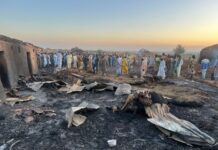 By Elizabeth Donnelly Published Thursday 3 May 2012
By Elizabeth Donnelly Published Thursday 3 May 2012
Boko Haram’s escalation of violent activity across northern Nigeria has been relentless.
In the space of a few years, it has transformed from a somewhat troubling group to a serious terrorist organization: better equipped, better organized and much more violent. In the past 18 months it has extended its geographic reach and expanded its range of targets. Helped by the fact that this kind of terrorism is a new phenomenon in Nigeria, Boko Haram’s changeability and rapid escalation have given it the advantage and made it the dominant violent organization in Nigeria’s north.
The problem of terrorism in Nigeria will get worse before it gets better. But options for effective responses to the challenges presented by Boko Haram and similar groups operating in northern Nigeria are not as limited as the scale of the challenge or complexity of the environment might suggest.
An effective response at this stage is difficult because indiscriminate terrorism on this scale is still new to Nigeria. And it is made more difficult because resolving the problem requires coordination and a nuanced approach – and success is dependent upon leadership and political cooperation in Nigeria that bridges region and religion.
Boko Haram’s attacks tend to come in waves and since 2010 it has demonstrated a growing capacity for organized and coordinated attacks with the effect of matching carnage with chaos, thus making immediate response more difficult. As its confidence and capacity have grown, Boko Haram has become less discriminating in its victims. Seven people died in the recent ThisDay bombings in Abuja and Kaduna, and more lives were lost in subsequent attacks on a Kano university campus church and on a police station in eastern Nigeria.
Multiple Threats
But there have been violent attacks in the north carried out by similar or affiliated groups and criminal gangs. The issue of multiple groups is an important one: for those tasked with tackling the terrorist threat from the north, it makes for a more amorphous set of actors to deal with – especially where the lines between pure criminal and religious-ideological interests overlap.
It also complicates things for these groups. There have been suggestions of discord within Boko Haram (in its early days its two founders went their separate ways once they found they did not share the same vision for the future of the group). But complex politics, relationships and disagreements are likely to emerge among the various groups in the event of competition over territory, resources, and profile.
While it is too reductive to explain Boko Haram’s emergence through socio-economic factors alone, it is no coincidence that it emerged from Nigeria’s most impoverished region, the north-east. Delivery on reforms in the power and agricultural sectors, critical to economic diversification in the country, would change the lives of all Nigerians – but in particular would allow for regeneration of the northern economy.
Local Focus
Nigeria’s federal and state governments and critically, local authorities and traditional leaders, need to (re)gain some credibility among their northern constituencies. Boko Haram – the core organization in its original form – emerged as a local group that recruited locally. In the shorter term therefore, gaining the trust of communities and engaging at this level is the best route to understanding and containing such groups, and to preventing further recruitment and radicalization.
What started as a local issue has taken on a regional dimension – which is inevitable with porous borders spanned by family ties, communities and trade. Policing Nigeria’s borders with Niger, Chad and Cameroon but without crippling the border economies is a key challenge.
International Response
International partners can provide advice, technical assistance and logistical support. But overt and overly interventionist involvement by international partners could worsen the problem: conferring upon Boko Haram an international profile that it does not – at least thus far – warrant and thereby motivating it to up its game.
International partners can play a crucial role in frustrating the development of Boko Haram’s relationships with regional and international terrorist groups. While informal relationships may already exist, Boko Haram and its affiliates/copycats remain largely Nigerian – the conflation of Nigerian groups with Al Qaeda in the Islamic Maghreb is unhelpful at best and damaging at worst. In terms of regional dimensions of the problem there is also a need to better understand illicit trading routes across the region.
Boko Haram presents one further challenge to this nascent democracy. There are serious concerns about what it is doing to the cohesion of this at times seemingly divided nation. But it is also thanks to Nigeria’s scale and diversity that Boko Haram cannot on its own put the country on a negative trajectory. Nigerians often remark that no condition is permanent, and the political will to implement a careful, nuanced and multifaceted strategy could shift the balance and start to slow and then reverse Boko Haram’s damaging march.
Elizabeth Donnelly, Africa Programme Manager
Culled from http://www.chathamhouse.org/media/comment/view/183149



